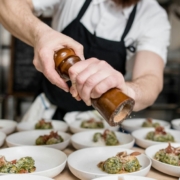2020 COVID Fashion Report – Does Your Favourite Brand Make the Grade?
By: Hope Media
The COVID-19 edition of Baptist World Aid Australia’s (BWAA) annual Ethical Fashion Report revealed that more than 70 per cent of companies assessed in 2020 could demonstrate that they had taken at least some deliberate positive actions to support vulnerable garment workers through the global pandemic.
However, despite these positive results, the crisis has also exposed the areas still needing vast improvement in the fashion industry, as no companies assessed were able to demonstrate an end-to-end supply chain response to the impact of coronavirus.
The recently released 2020 COVID Fashion Report highlights the extent to which more than 400 well-known brands worked to address the immediate risks facing workers in global fashion supply chains. Top scorers were the brands that could demonstrate action across all six “COVID Fashion Commitments”, which include:
- Support workers’ wages by honouring supplier commitments
- Identify and support the workers at greatest risk
- Listen to the voices and experience of workers
- Ensure workers’ rights and safety are respected
- Collaborate with other to protect vulnerable workers
- Build back better for workers and the world
A range of Australian and New Zealand brands such as Country Road, Glassons, Retail Apparel Group (Tarocash, yd. Connor), and Kathmandu were were recognised as top scorers in the Report, alongside a number of international brands such as Patagonia, The Iconic and UNIQLO.
Early 2020 saw 50 million garment workers lose wages, totalling US$5.79 billion, with more than half of garment manufacturers in Bangladesh reported in March that the majority of their in-progress or completed production had been cancelled by major fashion brands. By May, more than 30 per cent of Bangladeshi garment workers reported their children had gone without food.
The Report does indicate brands shifting focus, with 22 per cent of companies identifying “strengthening worker voice systems” as a key priority moving forward, and 16 per cent reporting “piloting or implementing new systems through the crisis period”.
BWAA CEO John Hickey said, “fashion companies have been literally fighting for survival in 2020”.
“But the wellbeing of the workers who produce the garments they sell must still be considered a core priority. Survival is critical, but it should not be achieved on the backs of their most vulnerable workers,” he said.
“The pandemic has impacted the fashion industry at great scale, with the potential of reversing a decade worth of progress made in improving the rights and conditions of garment workers across the globe. This special edition of our annual report aims to acknowledge the brands committing to stand with the workers during the crisis and motivate others to do the same.”
Find out what grade your brand received over at baptistworldaid.org.au.
Ethical Fashion Report
The annual Ethical Fashion Report grades clothing brands for their efforts to address worker exploitation and environmental degradation, BWAA has adjusted this year’s criterion to motivate fashion companies to commit to standing with the workers in their global supply chains. The coronavirus crisis presents the potentially slowing or reversal of a decade of progress made in improving the rights and conditions of workers making clothes around the world.
Article supplied with thanks to Hope Media.
Feature image: Baptist World Aid



